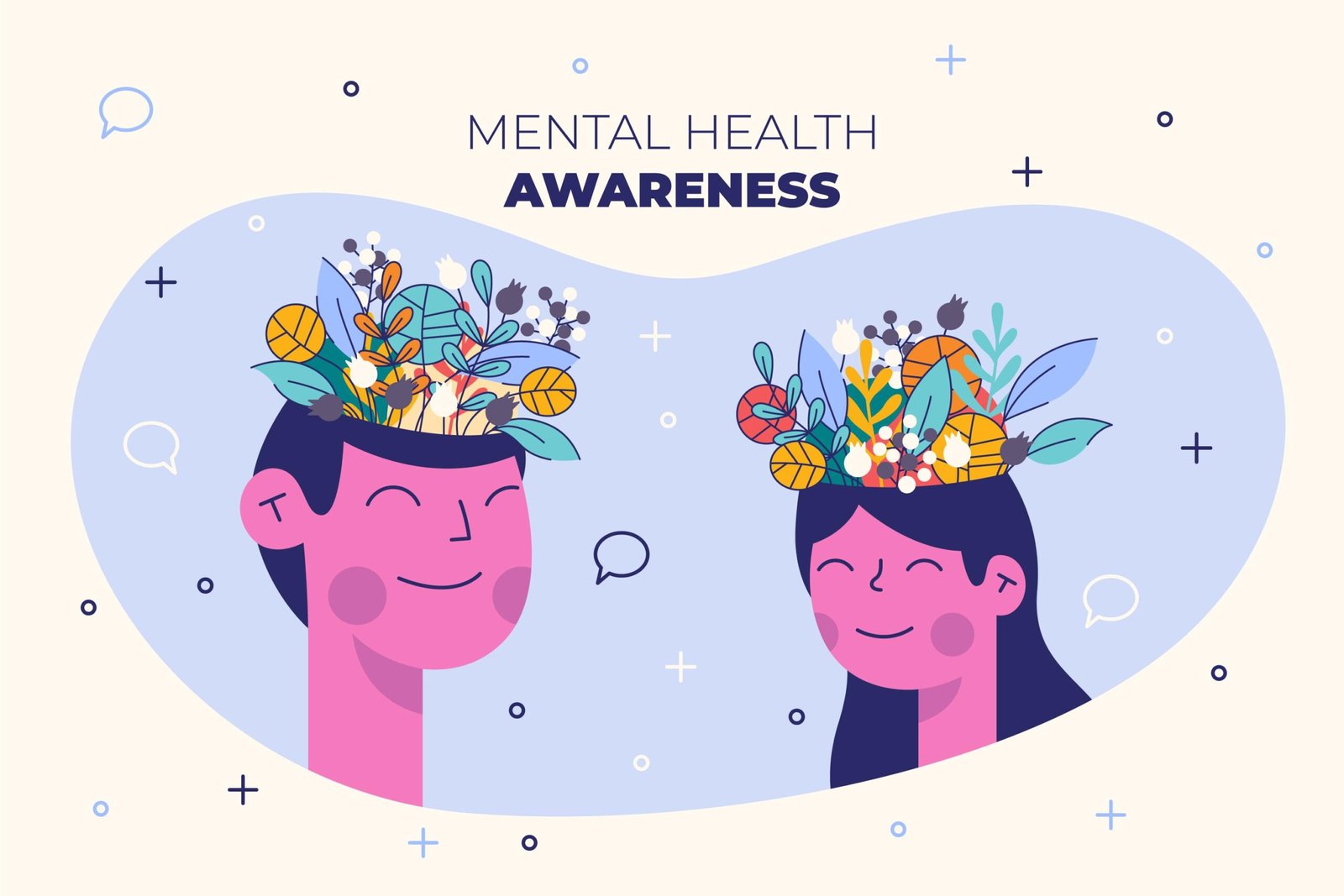Introduction
Mental health is the cornerstone of human well-being. It affects how we think, feel, and act in every aspect of life — from our personal relationships to our performance at work. Just as physical health keeps our bodies strong, mental health keeps our minds and emotions in balance. Unfortunately, while physical illnesses are openly discussed, mental health issues are often ignored or stigmatized. Understanding mental health, its challenges, and how to care for it is essential for building a healthier society.
Defining Mental Health
Mental health refers to the overall emotional, psychological, and social wellness of an individual. It determines how people handle stress, interact with others, and make decisions in life. A person with good mental health can cope with challenges, maintain healthy relationships, and contribute productively to society.
Main Elements of Mental Health:
- Emotional Stability: The ability to manage feelings and stay calm under pressure.
- Psychological Strength: Having self-confidence, self-awareness, and a sense of purpose.
- Social Connection: Building and maintaining positive and supportive relationships.
- Resilience: The capacity to recover quickly from setbacks or adversity.
Why Mental Health Matters
Mental health plays a key role in shaping our quality of life. When it is neglected, it can lead to emotional suffering and even physical illness.
Importance of Mental Health:
- Promotes Overall Well-being: A healthy mind supports a healthy body.
- Improves Relationships: Mentally strong individuals communicate better and form deeper connections.
- Enhances Productivity: People with good mental health perform better in school, work, and daily life.
- Encourages Self-Confidence: Good mental health promotes a positive self-image.
- Prevents Serious Disorders: Taking care of mental health reduces the risk of anxiety, depression, and other illnesses.
Major Causes of Poor Mental Health
Many factors can affect mental health, often working together in complex ways.
1. Biological Factors
- Genetic predispositions to mental disorders.
- Imbalances in brain chemicals (neurotransmitters).
- Hormonal changes or chronic physical illnesses.
2. Psychological Factors
- Negative thinking patterns or low self-esteem.
- Past trauma, abuse, or neglect.
- Excessive perfectionism or unrealistic expectations.
3. Environmental and Social Factors
- Poverty and unemployment.
- Family conflicts or relationship problems.
- Social isolation or loneliness.
- Overuse of social media and technology.
- Exposure to violence or discrimination.
Common Mental Health Disorders
Mental health issues can take many forms. Some are temporary, while others may require long-term care and management.
1. Depression
A condition marked by persistent sadness, loss of interest, and hopelessness.
Symptoms include:
- Fatigue and loss of motivation.
- Sleep problems and changes in appetite.
- Difficulty concentrating.
- Feelings of worthlessness.
2. Anxiety Disorders
Anxiety becomes a disorder when worry or fear interferes with daily functioning.
Types include:
- Generalized Anxiety Disorder (GAD)
- Panic Disorder
- Social Anxiety Disorder
Symptoms:
- Rapid heartbeat and sweating.
- Restlessness or irritability.
- Feeling tense or on edge.
3. Bipolar Disorder
Involves extreme mood swings between emotional highs (mania) and lows (depression).
4. Post-Traumatic Stress Disorder (PTSD)
Occurs after experiencing or witnessing traumatic events.
5. Obsessive-Compulsive Disorder (OCD)
Characterized by unwanted repetitive thoughts (obsessions) and actions (compulsions).
6. Eating Disorders
Include anorexia nervosa, bulimia nervosa, and binge-eating disorder — often linked to body image issues.
Signs and Symptoms of Poor Mental Health
Recognizing warning signs early can prevent more serious problems.
Common Warning Signs:
- Persistent sadness or anger.
- Withdrawal from friends and activities.
- Sudden changes in sleeping or eating habits.
- Decreased energy or motivation.
- Difficulty focusing or remembering things.
- Use of alcohol or drugs to escape feelings.
- Thoughts of self-harm or hopelessness.
How to Maintain Good Mental Health
Good mental health requires conscious effort and self-care. It is not something that happens automatically but can be developed through consistent practice.
1. Stay Physically Active
- Exercise releases endorphins that improve mood.
- Activities like walking, swimming, or dancing reduce stress.
2. Eat a Balanced Diet
- Include fruits, vegetables, lean proteins, and whole grains.
- Avoid excessive caffeine, alcohol, and sugar.
3. Get Enough Sleep
- Sleep is vital for emotional regulation and focus.
- Adults should aim for 7–9 hours per night.
4. Build Positive Relationships
- Surround yourself with supportive and understanding people.
- Communicate openly about your feelings.
5. Manage Stress Effectively
- Practice meditation, mindfulness, or yoga.
- Take regular breaks from work.
- Set realistic goals and avoid overcommitting.
6. Seek Help When Needed
- Talk to a counselor, psychologist, or psychiatrist.
- Join support groups or therapy sessions.
- Never hesitate to reach out if you feel overwhelmed.
7. Limit Screen Time
- Excessive social media use can increase anxiety and loneliness.
- Take digital breaks to focus on real-life experiences.
8. Engage in Meaningful Activities
- Pursue hobbies or creative outlets.
- Volunteer or help others — kindness improves mental well-being.
The Role of Family and Society
Mental health is not just an individual issue; it is a collective responsibility. Families, schools, workplaces, and communities must work together to promote psychological well-being.
1. Family Support
- Provide love, care, and understanding.
- Encourage open discussions about emotions.
- Avoid judgment or criticism of someone struggling mentally.
2. Workplace Support
- Employers should promote a healthy work-life balance.
- Offer mental health programs and counseling services.
3. Government and Social Responsibility
- Increase funding for mental health care.
- Raise awareness through campaigns and education.
- Ensure accessible treatment for all individuals.
Breaking the Stigma Around Mental Health
Despite growing awareness, mental health stigma still exists. Many people fear being judged, leading them to hide their struggles instead of seeking help.
How to Break the Stigma:
- Talk openly about mental health.
- Educate others and correct misconceptions.
- Treat mental illness with the same compassion as physical illness.
- Support people without discrimination or shame.
When society accepts that mental health is a normal part of life, more people will feel empowered to seek help and heal.
Conclusion
Mental health is not a luxury — it is a necessity for every human being. It determines our emotional stability, our ability to face challenges, and our overall happiness. Just as we care for our bodies, we must also care for our minds. Maintaining mental health requires balance, support, and understanding — both from ourselves and from those around us.








